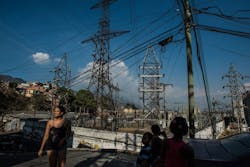Venezuela Plugs In Again after 19-Hour Outage
Refrigerators resumed their hum and computers rebooted across Venezuela after a 19-hour power outage shut down emergency rooms and grounded planes as leaders traded accusations about the cause.
As electricity was resumed in some areas of Caracas on the afternoon of March 8, much of the capital still remained without power. The metro was out of service and most businesses were shuttered.
The blackout was one of the worst in recent memory and came amid a weeks' long struggle for control, with Washington backing opposition leader Juan Guaido’s bid to unseat the autocratic President Nicolas Maduro. Hours after the country went dark on March 7, the Maduro camp sought to hold Washington responsible, accusing the United States of sabotaging the grid. Guaido said Venezuela was blessed with natural resources, but cursed by a usurper. U.S. Secretary of State, Michael Pompeo, said the crisis was a prelude to regime change.
Citizens reported blackouts from the Andes to the Caribbean coast, in about 19 of 23 states. The socialist government blamed an attack on the nation’s biggest and most closely guarded hydroelectric plant, but other sources of electricity failed to pick up the slack, including thermoelectric units in the country’s center and west.
‘Next, No Maduro’
“I admire the Venezuelan people who valiantly resist this latest attack from the enemies of the fatherland,” Maduro wrote on his Twitter account. “We will defeat them!”
The United States is one of 60 countries backing Guaido in his bid to form a transition government, saying Maduro’s latest term is illegitimate because it stemmed from a fraudulent election. Pompeo said blame for the blackout rested squarely on the socialist regime’s inefficiency: “Maduro’s policies bring nothing but darkness. No food. No medicine. Now, no power. Next, no Maduro.”
Across Venezuela, March 8 arrived amid an eerie calm. The government suspended work and schools in the country of 30 million after thousands were forced to walk home on darkened highways and avenues the evening before. The capital had the feel of a sleepy Sunday as residents walked dogs or sat in front of their homes. They waited for buses that never showed or at stores that didn’t pull up the security shutters.
Stop lights were blacked out and the metro was closed, but light traffic flowed. There were no reports of major violence or looting. Police and national guard forces clustered around government ministries.
‘Pay the Price’
“The only sabotage here is a government that doesn’t work, and its people have to pay the price,” said Mayrene Borges, a 55-year-old travel agency janitor who had waited hours for a bus. “There’s no electricity, no water and I won’t even talk to you about food.”
Residents gathered to listen to Guaido speak at a rally for International Women’s Day in Los Palos Grandes, an eastern Caracas neighborhood. Nearby, people queued to juice up their phones at a solar charging station.
“The crisis and tragedy are the government responsibility,” Guaido said to the crowd. “Maduro’s administration murders citizens by action and by omission. Fifty percent of hospitals don’t have electric generators, or they don’t work."
Indeed, video posted on social media showed doctors in a maternity ward delivering a baby by the light of mobile phones.
Miguel Lara, a former director of Venezuela’s power grid, said from Sao Paulo on March 8 that the blackout showed the deterioration of the infrastructure is even worse than imagined.
“Practically nothing is working anymore, not even the backup thermal-power plants,” he said. “We don’t have the replacement parts, the trained personnel.”
Rolling blackouts and water shortages have become a near-daily occurrence across Venezuela as infrastructure falls into disarray after years of mismanagement and exodus of personnel. Major cities and towns often lose power for hours at a time. According to industry analysts, the power crisis is due to neglect amid the country’s economic collapse.
However, on March 7, the public utility Corpoelec said, the blackout happened because the Guri dam was sabotaged. The facility in southern Bolivar state powers almost two thirds of the country.
The sabotage allegations simply aren’t credible, according to Lara. Guri, he said, is heavily guarded and a virtual attack could have been repaired by isolating faulty equipment.
“The consequences of something like this are grave,” he said. “Collective transportation doesn’t work, water stops pumping and the little perishable food people have at home must be thrown away. The economic losses for businesses and industries are huge for a country in an already poor situation.”
Juan Ponce, a 34-year-old business administrator, stood in a line of about 50 people at one of the city’s few open bakeries. It had both bread and an intermittently functioning debit-card reader.
“Every day is more depressing,” he said. “We feel trapped in a country where every day more and more opportunities close. We don’t know what’s coming tomorrow.”
